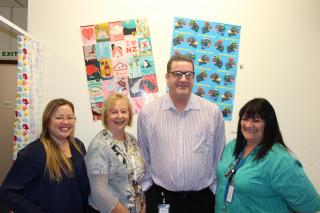- Home
- News
- Screening Matters, Issue 58, April 2017
- Come Hear – Improving audiology clinic attendance in Taranaki
News
- Screening Matters Newsletter
- April 2019
- April 2018
- December 2017
- August 2017
- April 2017
- December 2016
- October 2016
- March 2016
- November 2015
- August 2015
- June 2015
- April 2015
- February 2015
- December 2014
- October 2014
- August 2014
- June 2014
- April 2014
- February 2014
- December 2013
- October 2013
- August 2013
- June 2013
- April 2013
- February 2013
Screening Matters
The National Screening Unit newsletter
In this issue:
- Come Hear – Improving audiology clinic attendance in Taranaki
- Combined priority screening days in the Wellington region
- National Bowel Screening Programme update
- Primary HPV screening update
- Improving cervical screening rates for Asian women
- HPV vaccination and cervical screening
- BreastScreen Aotearoa mortality study published internationally
Come Hear – Improving audiology clinic attendance in Taranaki

The Universal Newborn Hearing Screening Programme aims to:
- screen every baby by one month of age
- complete audiology assessments by three months of age
- initiate appropriate medical and audiological interventions and early intervention by six months of age.
In April 2016, Taranaki DHB’s Audiology and Māori Health teams launched the Come Hear project, which aimed to improve health outcomes for Māori children by reducing DNA (Did Not Attend) rates at DHB Audiology clinics to less than 10 percent by October 2016.
The project team developed a new process which identified children at risk/high risk of not attending (DNA) their booked audiology appointments, and implemented an organised attendance pathway.
From 2008 to 2015 the DNA rate for Māori was between 20 and 31 percent per annum. In 2016, as a result of changes to the way the service engaged with whānau, the DNA rate dropped to 17 percent. For the month of January 2017, the DNA rate for Māori was 0%.
DNAs continue to fluctuate because numbers are small, but overall there is a downward trend. Most importantly, children have attended who otherwise would not have.
The following story is one example of how this strategy is working.
Baby D, who is of Māori ethnicity, was born at another DHB because his birth mother lived in that region. Baby D did not pass his newborn hearing screening and had already missed two of his screening appointments.
When Baby D was five weeks old, Taranaki DHB received an audiology referral from the other DHB, advising that he was now living in Taranaki with a new caregiver.
Baby D was booked and his caregiver brought him to his first audiology appointment 40 minutes late. The audiologist was unable to complete the assessment due to time constraints and another appointment was made which Baby D did not attend.
At that point, following the new process, the audiology administrator immediately contacted Kaimahi Hauora from the Māori Health team who engaged early with Baby D’s whānau. As a result, Baby D was brought to audiology before he was three months old, diagnosed with hearing loss, fitted for hearing aids and referred to early intervention services.
Hamish Clark, Taranaki DHB Audiology administrator says, “The new process of following up on DNAs early, with assistance from Raana and Denise in the Māori Health team has definitely improved audiology clinic attendance. The support Baby D and his whānau have received means mum is now really keen for him to be here”.
To receive the Screening Matters newsletter by email, fill out our sign-up form.

